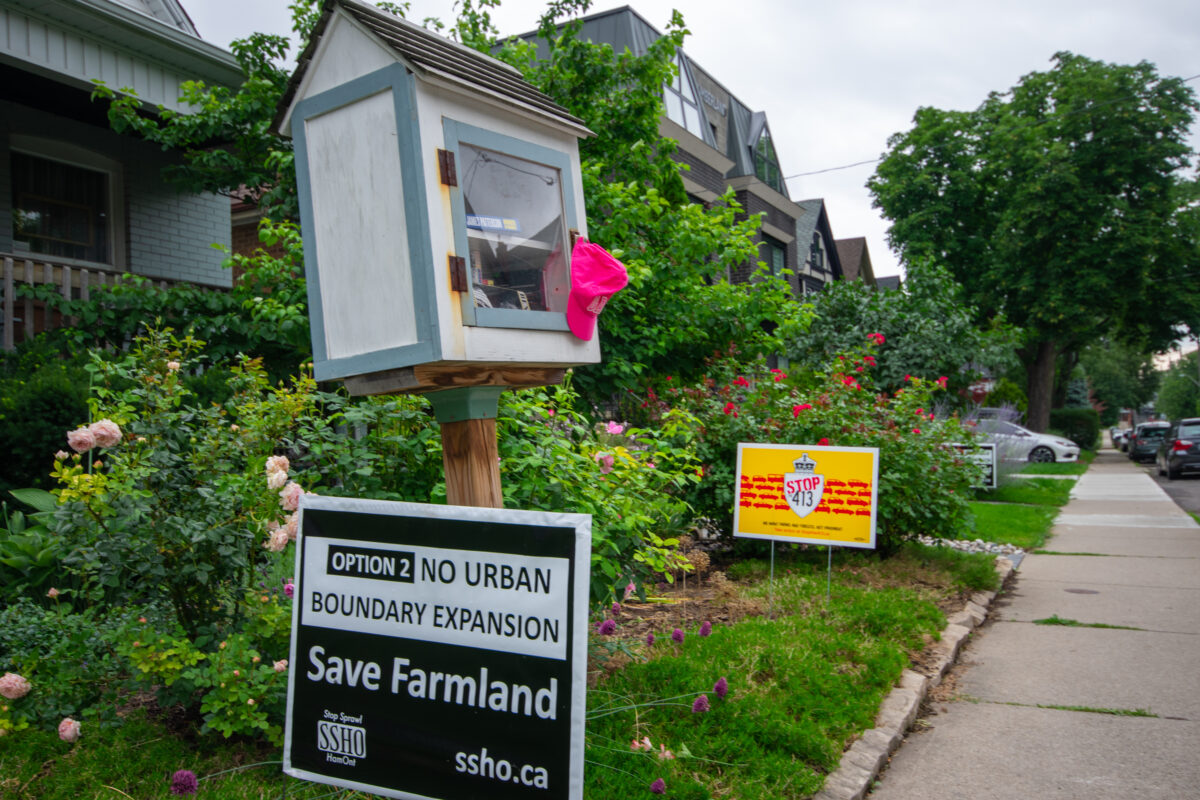City of Hamilton staff are asking Council to approve changes to the City’s sign bylaw which will give the City Clerk greater powers to regulate political signs and move the fines to an Administrative Penalty System, making it easier for the City to issue penalties for violations.
The new bylaw removes election sign regulations from the general sign bylaw and creates a new separate bylaw.
The new bylaw broadens the City Clerk’s regulatory power to include all political message signs.
Staff are recommending that Council discuss the changes in closed session, citing legal advice. The ability of municipalities to regulate political speech is limited under the Charter of Rights and Freedoms, and it is likely staff will discuss potential legal challenges to the new by-law.
If passed, the City Clerk’s regulatory authority will expand include signs “influencing electors to vote for or against an issue associated with a Candidate, Election or political party” such as issue signs on topics of neighbourhood development, transit, and any other political matter as deemed by the City Clerk.
The previous definition limited the City Clerk to regulating “signs advertising or promoting the election of a political party or a candidate for public office in a federal, provincial or municipal election.”
Ontario’s Municipal Elections Act does not grant municipal clerks the power to regulate political expression regarding issues.
The Ministry of Municipal Affairs website states “signs saying “Support local businesses” or “Keep the waterfront green” would not be third party advertising, even if a candidate has made those issues part of their campaign.”
The public report does not include any process for appealing a decision of the City Clerk, nor criteria for how the City Clerk will decide what constitutes “influencing electors” or what is “an issue associated with an Election”.
There is a separate “confidential” legal report which is not being released to the public.
The bylaw change comes as lawn signs are becoming a common tool in awareness campaigns such as the recent Stop Sprawl HamOnt campaign opposing the expansion of the urban boundary, and increasingly by neighbourhood groups against development projects.
The existing ban on displaying election signs until 28 days prior to the date of a municipal election remains in place. The new bylaw states there is a $50 fine for posting signs early.
The new by-law clarifies the ban against election signs on public property. candidates remain forbidden from placing their signs on public lands and roadways; however, the by-law clarifies they can use handheld signs, signs affixed to vehicles, and purchase commercial advertising space that is on public lands.
Candidates may be fined $200 for each sign on public property.
Plastering road medians with signs on election day is a campaign tactic some candidates have used to maximize their name exposure.
Election signs will now be prohibited with 100 metres of any voting place on election day and during advance polling. The ban includes signs on vehicles. As written, the by-law does not exempt private property lawn signs from the 100-metre regulation.
There was no public consultation regarding the bylaw.
Council will debate the changes during their Planning Committee meeting on January 11.


I believe all election signs will and should be banned on public property such as yard and road signs. Any advertising will have to be done via traditional means such billboards, transit, garbage containers etc.
A front yard may or may not be entirely on public property. It depends on the width of the road allowance. Except in older neighbourhoods where houses were often built close to the road, most of a front lawn is usually private property. Regardless, I oppose the ban on signs – it’s a clear violation of Charter rights to freedom of expression.
We’llput whatever signs we want on our property.
Absolutely wrong to have restrictions on issue signs. No public consultation, ridiculous!
What I put on my lawn or building is of no business of city council. Election signs are advertising, advertising is freedom of expression, freedom of expression is guaranteed in our Charter of Rights and Freedoms. Just hire some lawyers who went to Law School. End the damn secrecy at City Hall. You cannot carve election advertising out of the whole body and treat it differently than the rest unless you ban all public advertising period.